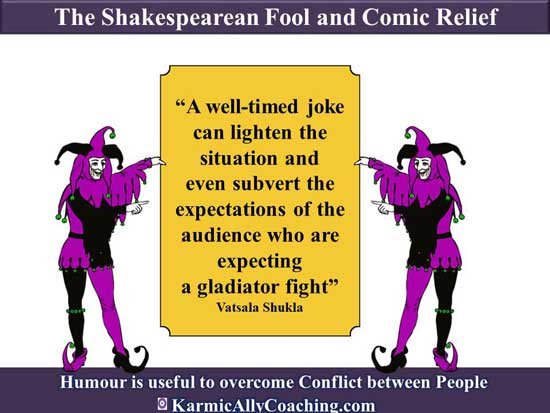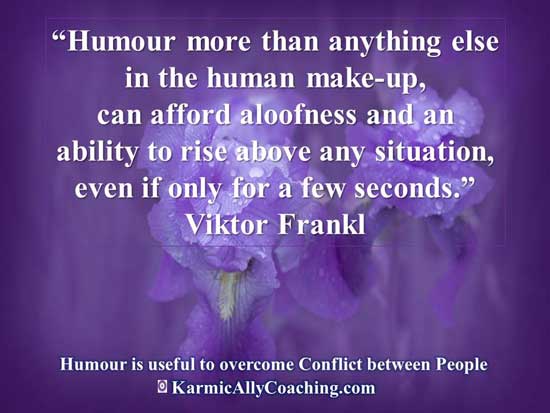This post has already been read 361 times!
Additional Resources:
Effective Leaders know the need of Humour to lead Productive Teams
Developing Your Self -Awareness
Man’s Search for Meaning by Viktor Frankl
Prefer to read? Here’s the transcript

Having a good sense of humour is often the best tool you can apply to resolve situations from getting out of hand.
It can avert a full-blown conflict where both sides stand to lose while the bystanders get free entertainment and fodder for gossip.
Let’s look at an example.
Imagine 2 coworkers are in a state of conflict over some issue. It doesn’t matter what the issue is but it’s clear to everyone that the conflict has been brewing all day.
The tension in the atmosphere is palpable. You could cut it in slices with a knife!
There’s lots of whispering going on about the situation.
The combatants are at crisis point, and it feels like the entire office is holding their collective breath waiting to see what happens next. It’s like they’ve become the audience to a TV reality show. At this point, they’re ready for bloodshed, or at the very least, some very strong words.
The last thing they expect is for one of the key players in the conflict to open their mouth and… make a joke?
Maybe it doesn’t feel like a resolution to the conflict, but actually, laughter goes far beyond being the clichéd ‘best medicine.’
How?
First of all, laughter takes the tension out of the situation.
This is exactly what’s needed to regain perspective, build stronger bonds, and yes, sometimes smooth over the differences.
Hi, I’m Vatsala Shukla from Karmic Ally Coaching. I believe humour, when used appropriately is a useful tool to diffuse tension. It creates space for both conflicting parties to take a breath and regain their clarity and composure.
Humour is a vital tool that can help us gain perspective even in the darkest of moments.
In his book Man’s Search for Meaning, neurologist, psychiatrist, and Holocaust survivor Victor Frankl said, “Humour more than anything else in the human make-up, can afford aloofness and an ability to rise above any situation, even if only for a few seconds.”
You’d have seen the role of humour in diffusing tense situations in dramatic or highly emotional stories where there are some comedic scenes.
This is called comic relief and is meant to alleviate some of the tension.
It provides the audience with a chance to breathe from the story drama or a moment to process the things that just occurred.
It’s similar to how we use jokes to ease the heaviness of a difficult or awkward situation.
A timeless example that comes to my mind is The Shakespearean Fool who appears in plenty of Shakespeare’s tragedies like Othello and King Lear.

In our imaginary example, a well-timed joke can lighten the situation and even subvert the expectations of the audience who are expecting a gladiator fight.
Humour helps to connect people, building rapport, alleviate tension and foster a positive culture. A Robert Half survey found that 91% of executives believe a sense of humour is important for career advancement; while 84% feel that people with a good sense of humour do a better job.
In a previous post, I highlighted how leaders with a sense of humour create better bonded teams.
If humour is that important, then how do you effectively use it to resolve conflicts?
Here are 3 tips on applying humour. I suggest you try them.

First, make sure that both parties are ‘in on the joke.’
By keeping humor wholesome – not at the expense of the other person, you’re focusing on inviting them to laugh with you, rather than laughing at them.
How can you tell if you’re doing it right? Humor is tricky, and so your best indicator of getting it right is to gauge the other person’s reactions. If they’re not laughing, chances are they don’t find it funny. Stop!
Second, check to make sure that you’re not using humor as a defensive weapon.
If you’re using humor to mask emotions that you’d rather not deal with right now, then stop immediately. Ask yourself what it is that you’re not dealing with and why.
Even though we know humour helps us stay resilient when facing challenges, there are times when humour isn’t healthy.
This happens when it is used as an avoidance technique rather than coping with, painful emotions. Laughter can be a disguise for feelings of hurt, fear, anger, and disappointment that you don’t want to feel or don’t know how to express.
Finding an amusing aspect to a situation is different to using it as a cover up for other emotions. Strong emotions need to be managed differently to avoid conflict or create confusion and mistrust in your relationships.
This requires self-awareness which is an important element of Emotional Intelligence and I’m sharing a link to a resource that will help you develop it.
Third, work on that sense of humor.
Every good comedian knows how to read their audience. The same goes for using humor with another person, especially in a situation that’s already a conflict. Watch the nonverbal cues. What language are you using? Keep the tone positive and light and mean it.
That means don’t use jokes as a means of cruelty. Lastly, consider what you might use as an inside joke. Inside jokes not only keep the situation light but create a deeper intimacy with whom you conflict.
Need more ideas? Explore humor in other ways so that you always have a repertoire to fall back on. Watch things you find funny on TV or in movies. Listen to jokes. Read the funnies. Find that side of you that likes to play and encourage it with creativity and fun.
And no matter what, cut yourself some slack. It takes practice to be funny. Keep at it, and you’ll find your natural sense of humor, and be able to tap into it when you need to. That conflict won’t know what hit it!
I’ve included some more resources in the description including how to use humour as a leader. Have a look at them. Apply them. This is Vatsala Shukla from Karmic Ally Coaching signing off. Bye for now.




 I adhere to the Certified Coaches Alliance Code of Ethics and Standards. A copy is available on request.
I adhere to the Certified Coaches Alliance Code of Ethics and Standards. A copy is available on request.
 Let's Talk through the Connect Form:
Let's Talk through the Connect Form: